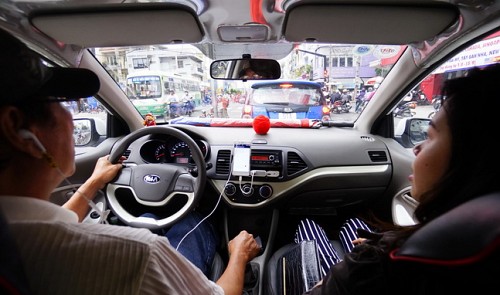Uber remains the only mobile application-based transport company in Vietnam to duck business registration and tax obligations, leaving its drivers and customers with limited legal protection.
The Vietnamese Ministry of Transport has recently demanded that the transport departments of Hanoi and Ho Chi Minh City tighten their grip on contract cars that employ Internet applications in their operations.
Among the taxi companies operating in Vietnam that fall under the request’s scope of effect, including Grab and local taxi operator Vinasun, Uber remains reluctant to legalize its operation in the Southeast Asian country.
Uber, a smartphone app originating in the U.S. that allows people to hail a private car, has been around in Vietnam since June 2014.
The application, managed by its Netherlands-based parent firm Uber B.V., contracts local car owners to become its drivers, who use their own vehicles and only have to share 20 percent of each ride’s fare with the company, with the remaining 80 percent going to their own pockets.
As Uber is not represented by any legal entity in the country, the Vietnamese government is losing substantial amounts of tax, while the company’s drivers and customers have little legal protection.
According to Le Hoang Minh, deputy director of the Ho Chi Minh City Department of Transport, his department has made several requests to Uber’s parent firm in the Netherlands for an online transport contract plan, but to no avail.
Therefore, Minh said, Uber is not complying with Vietnamese laws when operating its online transport service, avoiding many requirements of a legal transport company such as business registration, taxi signs, and in-car journey recorders.
In administrative terms, the deputy director continued, Uber is also immune to its drivers’ actions, such as in the case of an armed robbery last month by a Uber driver in Ho Chi Minh City, where the company was subject to little to no liability.
Uber has been avoiding its tax obligations by insisting that they are merely offering software solutions instead of running a transport service.
In reality, Minh said, the company is setting its service fee, offering support policies, and charging customers travel fares like any other transport company.
Uber drivers are also at their own risk of being out of work without eligibility for any insurance or welfare program, for their employer is not a registered business.
Meanwhile, passengers are subject to less legal protection in the event of a robbery or assault by an Uber driver, as handling the crime will be a more demanding task without journey recorders, Minh explained.
Uber fares would not be cheap, if…
If Uber had been paying its tax and following regulations on conducting taxi business, its fares would not have been so favorably cheap compared to other services, said Do Van Thang, general director of Mai Linh Group, a taxi operator in Vietnam.
In addition, Thang said, being unregulated by the fixed-price policy which applies to all registered taxi businesses in Vietnam means that Uber can adjust fares depending on the hours and traffic, which actually does not make it so cheap during rush hour.
It creates unfair competition among similar service providers when Uber can incur lower operating costs, as the firm does not have any responsibility for the vehicles and does not have to pay insurance for the drivers either, in addition to an absence of taximeters, receipt-printing machines, and control centers.
According to Ta Long Hy, chairman of the Ho Chi Minh City Taxi Association, the unfair advantage Uber enjoys can be balanced out by requiring the company to fulfill tax duties and comply with Vietnamese regulations on offering transport services.
|
Since August 2015, 263 Uber cars have been fined a total of VND884 million (US$39,464) by the Ho Chi Minh City Department of Transport, according to its Deputy Chief Inspector Le Hong Viet. Out of the 263 cars, 95 failed to provide business registration papers, 85 lacked passenger transportation contracts, 39 lacked taxi signs, while the remaining 24 were found having no journey recorders installed. |
























































